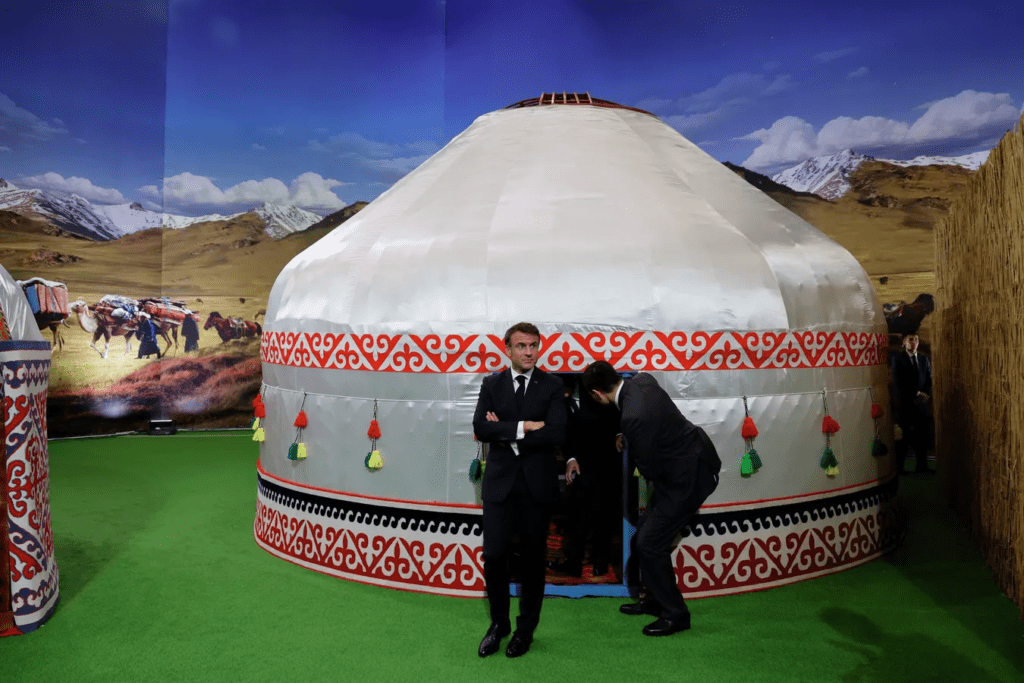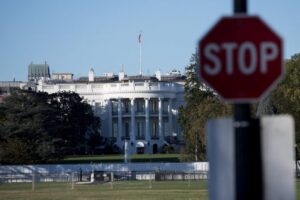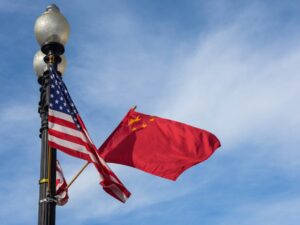
In November last year, French President Emmanuel Macron toured Central Asia, visiting Kazakhstan and Uzbekistan. Paris held talks with the leaders of these Central Asian States to strengthen economic and political interaction with the countries of the region. At the same time, Astana and Tashkent are also interested in developing cooperation with France.
It should be noted that the visit was quite dynamic. On one day Macron visited Kazakhstan and on the other Uzbekistan. At the same time, he was accompanied by an impressive delegation, which included state ministers and the leaders of the main energy, industrial and agricultural companies. Hence Paris’ main objective: strengthening its energy security.
This is due to the fact that the French authorities intend to increase the volume of uranium supplies from Kazakhstan and Uzbekistan after the loss of a major supplier as a result of the coup in this country, Niger. In addition, the European Union imposed sanctions on the African country.
Considering the fact that nuclear generation provides up to 70% of France’s electricity, Paris’s desire to ensure its energy security largely determines its increased attention to Astana and Tashkent.
In this direction, the interests of the parties coincide, since the Republic of Kazakhstan and the Russian Federation aim to diversify uranium exports, being their main global producers (Kazakhstan: 43% of world production. Uzbekistan: about 7 %). At the same time, Kazakhstan represents 27% of the uranium purchased by France, and that of Russia 19%.
In all likelihood, at the same time, the French pressed for the participation of their companies in the construction of nuclear power plants in Kazakhstan and Uzbekistan, but did not reach any specific agreement. In this sense, the position of the Kazakh leader Kassym-Jomart Tokayev is indicative that the decision on the construction of a nuclear power plant will be decided by the people of the country in a national referendum. It is also notable that Astana, following a multi-vector strategy, is considering a wide range of potential foreign partners in this project, including China National Nuclear Corporation (CNNC), Korea Hydro & Nuclear Power (KHNP) of South Korea , the Russian Rosatom and the French EDF.
In addition, the French are interested in cooperating with Kazakhstan as a source of rare earth metals, which at the current stage are of strategic importance for the transition to “green” energy. These metals play a vital role in the manufacturing of a wide range of technologies, from smartphones to wind turbines and battery packs for electric vehicles.
Europe is currently heavily dependent on China for the supply of rare earths. This dependence on a single supply chain is risky and endangers its technological progress. By actively deepening ties with Kazakhstan, France and Europe can diversify their rare earth metals supply chains.
The move will reduce its dependence on the People’s Republic of China and promote greater economic independence and resistance to potential trade disruptions. Therefore, as a result, it is worth noting the agreement signed by the heads of the Republic of Kazakhstan and France on the construction of a wind park and the declaration of intent for cooperation in strategic minerals.
In turn, Kazakhstan and Uzbekistan are interested in economic and investment partnership, as well as technology transfer from France and other European countries. In this sense, it is necessary to pay attention to transportation and logistics. The countries of the European Union, and France in particular, can actively contribute to the development of the “Middle Corridor” connecting China and Central Asia with Turkey and Europe.
On the political level, Macron during his visit to Kazakhstan and Uzbekistan demonstrated Paris’ desire to maintain its influence in Central Asia, where there are already many players, including Russia, the United States, China and Turkey. This is due to the fact that France does not want to miss its opportunity, given that Kazakhstan and Uzbekistan aim to pursue a multi-vector foreign policy.
With the start of the Russian-Ukrainian conflict, the role of the Central Asian region has increased, as evidenced by the large number of summits and their participants. In parallel, Kazakhstan and Uzbekistan aspire to greater economic openness and a balanced foreign policy, while Russia remains their main partner. At least in the short and medium term, this trend will continue.

In conclusion, deeper interaction with Central Asia is crucial for both France and Europe in general. Strengthening ties with Kazakhstan and Uzbekistan could ensure the energy security of the European Union, establish the supply of rare earths and form a geopolitical balance in the Central Asian region.
This partnership could solve the growing oil and gas problems of European countries. Disruptions to global energy markets in recent years, coupled with political tensions, have highlighted the need to diversify European energy sources. Central Asia, with its untapped hydrocarbon reserves and renewable energy potential, is an efficient solution.
France’s growing presence in the region, beyond a simple counterweight to the influence of great powers, could actively contribute to the development and importance of the “Middle Corridor.” It offers Europe alternative trade routes that can shorten transit times, but also highlights the strategic importance of Central Asia as a bridge between east and west.
Astana and Tashkent see their cooperation with the European Union as an opportunity to strengthen their international positions, including in relation to Moscow and Beijing, while attracting investment and modernization. They are also positioned as reliable and strategic trading partners of European countries in the field of raw materials.
Note: this is an article republished from the media “Tarpán” through a cooperation agreement between both parties for the dissemination of journalistic content. Original link.

Full Professor at the National University of Kazakhstan and Doctor in Geographic Sciences at Abai University.
Source: https://reporteasia.com/opinion/2024/04/08/macron-politica-exterior-francesa-asia-central/

